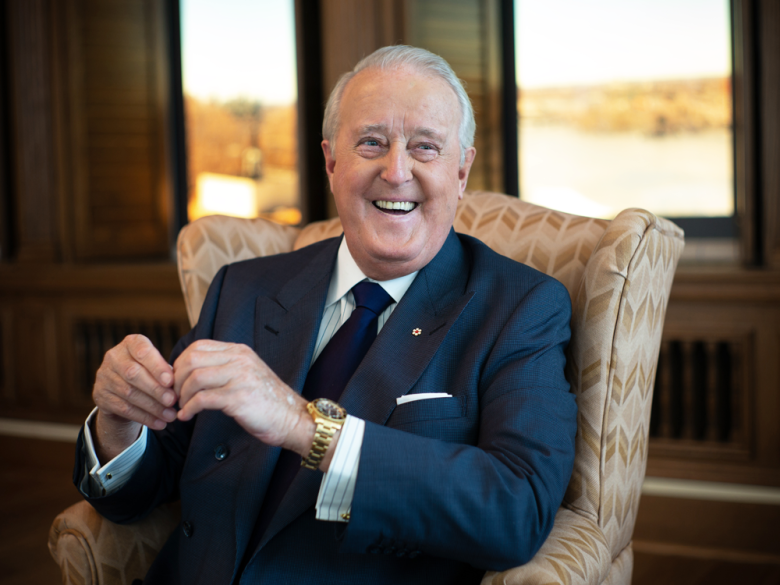OTTAWA — In a speech that takes veiled shots at Justin Trudeau, Andrew Scheer and Stephen Harper, former Prime Minister Brian Mulroney is calling for Canada to increase its foreign aid spending, re-engage with the United Nations, and stop telling the world “Canada is back” without taking action to back it up.
“The world stage is the big leagues, and if you want to play successfully there you have to conduct yourself that way,” Mulroney said in prepared remarks, shared with the National Post, for a speech at a United Nations Association in Canada (UNA-Canada) event on Thursday night in Toronto.
Mulroney opened the speech with a criticism of Harper’s Conservative government over getting rejected for a UN Security Council seat in 2010, calling it embarrassing. He said Canada had bid successfully for a Security Council seat six times before the rejection.
“(It) is not, as this embarrassing rejection was characterized by the then-government of Canada, ‘a badge of honour’,” Mulroney said. “Stridency, disruption, and bellicose — but ultimately meaningless — hollow threats are not synonymous with principle and never lead to successful outcomes.”
Hollow threats are not synonymous with principle
Mulroney went on to say Trudeau hasn’t done enough to restore Canada’s image. “For all the self-congratulatory talk that ‘Canada is back,’ the world has taken note that the rhetoric has not been matched by action,” he said. “If we want to dress the rhetorical ‘Canada is back’ up in appropriate clothing, we must begin by gaining the respect of allies by paying our own way.”
From there, Mulroney laid out his ideas for rebuilding Canada’s international credibility. He started with a call to drastically increase Canada’s “anemic and embarrassing” foreign aid spending — the exact opposite of what Scheer’s Conservatives promised in the last election campaign, when they proposed to cut foreign aid spending by 25 per cent.
“(Former Prime Minister) Mike Pearson set the target for industrialized nations to commit 0.7 per cent of GDP to foreign aid,” Mulroney said. “My government raised our contribution to 0.5 per cent en route to the objective. Then for 25 years, it has been all downhill. Today Canada is stuck at an anemic and embarrassing 0.26 per cent of 1 per cent.”
It marks the second time this week that Mulroney has given a speech that appears to criticize Scheer’s approach to the last campaign. Earlier, accepting an environmental leadership award, he urged Canadian politicians to take much bigger action on climate change even if it’s unpopular with “the base.” Two of Mulroney’s children — Caroline and Mark — have been occasionally floated as potential federal Conservative leadership candidates.
Mulroney’s other prescriptions for increasing Canada’s clout were to increase defence spending and take a lead role in UN peacekeeping missions.
He cited former Liberal cabinet minister John Manley, who said in 2008 — while leading an independent panel studying Canada’s mission in Afghanistan — that Canada too often leaves for the bathroom when the bill arrives at an international meeting.
“This has unfortunately over time become accurate, but it is a pathetic manner for a great nation to seek or assert ambitions of international leadership,” Mulroney told the UNA-Canada, whose mission is to promote the work of the UN. “It assumes that our allies and opponents cannot read or count — but believe me, they can do both.”
Mulroney won back-to-back majority governments in 1984 and 1988 as leader of the Progressive Conservatives. He said his government wasn’t perfect, but “in complex areas of international relations, my government quickly learned how to operate in order to produce strong beneficial results for Canada.”
We now live in a world where the events of the moment signal unrelenting pressures of instability
“We led the worldwide effort to feed the starving of Ethiopia and played a major role in the liberation of Nelson Mandela, and working in the G7, the Francophonie, the Commonwealth and in the United Nations we saw the end of the reprehensible system of Apartheid,” he said. He also said Canada argued successfully for a UN authorization of force in response to Iraq’s invasion of Kuwait in 1990, and noted a Canadian had been president of the UN Security Council at the time.
He ended his speech with an appeal for more support for the UN in an age where the U.S.’s leadership on the world stage is on the decline.
“We now live in a world where the events of the moment signal unrelenting pressures of instability, where the U.S. inclination and capacity to assert global leadership is on the wane and where the principles of multilateralism so helpful for the last half of the last century are now under assault,” he said.
• Email: bplatt@postmedia.com | Twitter: btaplatt





























